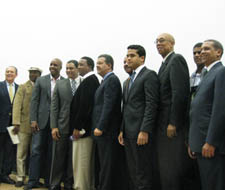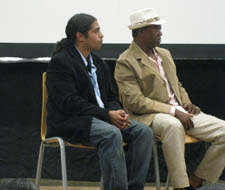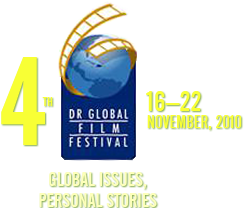

Dominican Republic Global Film Festival Organizers Attend the Berlin Film Festival
Berlin, February 20, 2011Dominican Republic Global Film Festival Attending the 33rd International Court Métrage Festival in France
Santo Domingo, February 8, 2010Dominican Republic Global Film Festival Celebrates the Nominations of 127 Hours
Santo Domingo, January 25, 2010An Even Grander Finale than Ever Newly Honored Liza Minnelli brings down the Curtain on Fourth DR Global Film Festival
Santo Domingo, November 21, 2010Closing Film of the 4th Dominican Republic Global Film Festival Delights Audiences, Young and Old
Santo Domingo, November 21, 2010Jury Chooses First, Second and Third Place Winners in the Second Annual Short Films Competition
Santo Domingo, November 21, 2010Actors workshop: Jimmy Jean Louis's Method for Acting Success and Getting Haiti and DR Together
Santo Domingo, November 21, 2010Short Films: The Beginning of Everything
Santo Domingo, November 21, 2010"Waste Land,” a documentary defending the environment
Santo Domingo, November 20, 2010A Dominican Passion
Outsourcing Baseball Development: Anthony Alcade’s "Buscón"!
Santo Domingo, November 20, 2010Web 3.0 is coming!
And the possibilities for small film producers are exciting!
Santo Domingo, November 20, 2010Profile of an actor: From the Stage to the Screen
Santo Domingo, November 20, 2010“Traces of the Trade: A Story from the Deep North” Personal Story of Discovery, History and How one Family Faces the Sins of their Ancestors
Santo Domingo, November 20, 2010
“Buscón” Shows at Mauricio Baez Cultural Center Followed by Panel Packed with
Pro Baseball Players
Santo Domingo, November 20, 2010

The screening of Anthony Alcalde’s documentary, “Buscón,” about the vulnerability of young Latin baseball talent and the accompanying corruption and exploitation, brought together a full round table of Major League baseball talent in a lively and, at moments, controversial conversation. Panelists, speaking after the screening in the packed Mauricio Baez Cultural Center, included such baseball legends as Juan Marichal, Sammy Sosa, Pedro Martinez, Barry Bonds and Cristian Guzman. Dominican President Leonel Fernandez was also in the audience.


Alcalde’s film takes a close look, through the eyes of the buscones (baseball scouts) as well the young players and their families, at the system of scouting young latino players, signing them for as cheaply as possible through scouts who skim unfair percentages of their signing fee and then what happens to the vast majority of them who don’t make it into the big leagues but are strung along for years in A Division teams for practicing purposes. In Nicaragua, the film’s focus and Anthony’s native country although he was raised and resides in the US, as well as the Dominican Republic, young players can be drafted and signed at the age of 16-and-a-half with no requirement for them to have finished high school. In the US, a player can join a farm training team at 16 but cannot be signed until he has graduated from high school.
When the film ended to thunderous applause, the table was set up and the baseball legends took their places along with director Alcalde, Dominican baseball scout Astin Jacobo and Charles Farrell, co-founder of DR Sports and Education Academy.
The pro baseball players all seemed to concur that the buscón was a necessary evil in the complicated and money-drenched world of professional baseball. Indeed most of the Dominican players sitting on the panel were drafted while still young, from working class families and some from rural Dominican towns.
That was the beginning of the conversation, however. As the discussion progressed, each Dominican player, with the exception of Cristian Guzman the only non-retired player at the table, had a story to tell or a criticism to wage about how the system works and therefore what role the baseball scout plays in it.
“What do you make when you sign a player?” insisted Pedro Martinez in a direct question to the only official scout on the panel, Astin Jacobo. Martinez, temporarily retired after having sustained several injuries, said he was indignant at the way Dominican players have been treated over the years.
“They come into our homes and insist on seeing our birth certificates and ask our mothers personal questions about how many children they’ve had and when,” said Martinez. “Anyhow, it is cheap labor just like Nike and the call centers around the world, that way it’s easier for them to get rid of them when they’re finished.”
Martinez pointed out that only 2 % of the players who attend the so-called baseball academies in the US or in their own country ever get signed and only 1% actually make it big. “What happens when those 98% who leave the academy, go abroad then don’t get signed? I’ll tell you what, they are tossed out and don’t return to the academy or any other kind of school,” said the historic pitcher referring to the baseball academies that are ostensibly training young men in useful skills in the event their dream of going pro doesn’t come to pass.
Juan Marichal, the first Dominican inducted into the Baseball Hall of Fame in 1983, stressed that young people should be required to finish high school and certainly be admitted back into the academies once they’ve not achieved their dream to play pro.
“Baseball is for a short time but your education is forever,” said Marichal whose pitching style – a windup in which he raised his left foot head-high or higher – captivated baseball fans for several decades.
Anthony Alcalde said that the MLB (Major League Baseball) should take responsibility for the education of the young players it drafts and uses until they decide to sign them or not.
Barry Bonds told the viewers that he chose, under his parents’ influence, to finish university before beginning his extraordinary baseball career.
The essence of the roundtable discussion ended up in a plea to the MLB to
treat latino players with the same respect as they treat their own American
players and, these days, Japanese players.
“There is something called the ‘Latinization of baseball’ and it seems the
Americans don’t want so many latinos in the game. It’s racism,” said Alcalde.
“They look at them as cheap labor. It has happened before in our country in
other sports.”
Alcalde said he intends to continue his efforts, with his film, to raise awareness in the hope of improving the situation for young baseball players who may be exploited by unscrupulous baseball scouts.
A former second baseman himself, Anthony Alcalde said “never in my wildest dreams would I have thought to have garnered so much attention and to be among so many baseball greats as I have at the DR Global Film Festival…and the President was in the audience.”
See more photos on Buscón, Mauricio Baez Cultural Center, Nov. 19 >



